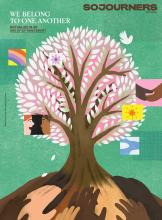SEVENTY-FOUR YEARS AGO, scholar, mystic, and pastor Howard Thurman gave a lecture series at Samuel Huston College (now Huston-Tillotson University) in Austin, Texas. The series would become the basis for his seminal book Jesus and the Disinherited. One of Thurman’s students, Martin Luther King Jr., reportedly traveled with a copy of Thurman’s book. Through his writings and teachings, Thurman was a mentor and chaplain for many activists during the civil rights movement.
Jesus and the Disinherited continues to inspire many contemplatives and activists and has profoundly shaped my own approach to ministry. The main inspiration comes through a question Thurman posed to American Christianity: “What, then, is the word of the religion of Jesus to those who stand with their backs against the wall?” Thurman’s question confronted the fact that American Christianity was, as historian Vincent Harding put it, a “strange mutation” away from the teachings and ethics of Jesus. Jesus, who was raised in the poor village of Nazareth out of the mainstream of Roman culture. Jesus, who was Galilean, which meant that even among the Jews, Jesus and his people were considered outcasts. Jesus, who spent many of his days moving from town to town touching lepers, transgressing boundaries, befriending Samaritans, and turning over the tables on corrupt economic practices in the temple. In light of Jesus’ ministry, Thurman was challenging an American Christianity that was rampantly materialistic and segregationist, looming above the daily experiences of the disinherited. Thurman’s writings demonstrated how a path-altering question can help inoculate our faith from harmful (American) mutations and point us back to the integrity of Jesus’ Way.
Read the Full Article

